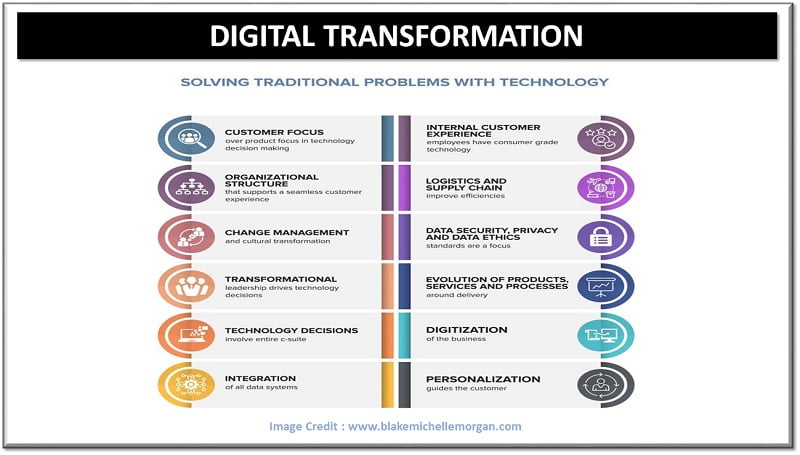Cybersecurity has emerged as one of the prominent concerns for businesses worldwide. As a matter of fact, spending on cybersecurity has been increasing continuously. However, the rising number of cybercrimes shows that hackers can always find vulnerabilities in the systems. At this point in time, the applications of blockchain for cybersecurity have been considered a viable alternative to ensure productive safeguards against cybersecurity threats.
How is blockchain different from the existing tools used for cybersecurity? The burden of cyber-attacks on the global economy amounts to over $1 trillion, which is around 50% larger than the costs registered in 2018. Therefore, it is important to understand how blockchain can save the world economy and businesses from threats to their security.
The Continuously Growing Threat of Cybercrime
One of the first things to consider while finding how blockchain fights cybercrimes is the understanding of the threat. The most problematic aspect of cybercrime is the ability of hackers to adapt to new security measures. At the same time, malicious agents have no fear of the moral consequences of their actions. As a matter of fact, around 40,000 new domains were registered with keywords that were associated with the crisis. The websites were able to garner a soaring rise in traffic levels by taking advantage of the desperation of people during the pandemic.
Cybercriminals also come up with other innovative ways to break into the user’s security. The possibilities of social engineering attacks and phishing attacks have been dominating the arena of cybersecurity. At the same time, the introduction of cryptocurrencies has also boosted crypto cyber crime incidents due to blockchain-based vulnerabilities. Is it reasonable to depend on blockchain for fighting cybercrime? Let us find out how blockchain can help in addressing security problems.

Impact of Blockchain on Cybersecurity
The review of the applications for blockchain in cybersecurity must emphasize the ways in which blockchain can transform security. First of all, you should notice how blockchain provides an effective answer to cybersecurity through cryptography advantages. Here are the distinct ways in which blockchain can provide radical improvements for cybersecurity.
Better Privacy and Security
Blockchain technology leverages the use of a hash function for connecting blocks with each other. Therefore, every transaction recorded on a blockchain features a corresponding hash function to the previous block. Most of the blockchain cybersecurity use cases depend on advantages with the fact that hackers would have to break the hash functions of all the previous blocks to compromise the content on one block. In addition, blockchain provides the assurance of immutability. Once you have uploaded a transaction on the blockchain, it is impossible to introduce any modifications.
Distributed Network Security
Another vital highlight in using blockchain for better results in cybersecurity points at distributed network security. Blockchain is a distributed ledger technology that can facilitate safeguards for important external systems such as the DNS for websites. Blockchain-based services can address the existing vulnerabilities in the use of Domain Name Services or DNS.
You can learn how blockchain fights cybercrimes to the advantage of reducing risks through the creation of a broader network of security keys. The decentralized approach to security, such as the use of consensus mechanisms, can resolve many conventional problems in cybersecurity.
Better Transparency
The applications of blockchain technology for safeguards against cybercrime would also rely on how blockchain can offer transparent audit trails. Blockchain provides a decentralized ledger, which ensures that every member of the peer-to-peer network can achieve a clear impression of every transaction on the network. The ability to view the transaction history provides effective facilities for tracing data movement on the blockchain.
Challenges for Blockchain Uses in Cybersecurity
The applications of blockchain for cybersecurity also invite attention to the potential concerns for the security of blockchain itself. For example, doubts such as “Is blockchain safe from cyber-attacks?” have been becoming more prominent with new incidents of attacks on blockchain-based applications.
For example, public blockchains don’t have anything to safeguard data privacy. Therefore, anyone could view and retrieve transaction data, thereby creating setbacks in controlling what type of data can be accessible through blockchain. On top of it, scalability can also present a formidable setback for the implementation of blockchain in addressing cybersecurity concerns.
Final Words
The review of important topics regarding the role of blockchain in improving cybersecurity shows that blockchain technology can redefine security. You can notice how the different traits of blockchain for cybersecurity provide a reliable impression of its advantages. At the same time, you must also take note of the challenges of implementing blockchain technology to resolve issues in cybersecurity.
Furthermore, the continuous growth in the number of cybersecurity attacks every year demands the introduction of innovative solutions like blockchain. You can find career opportunities in blockchain security by learning through a blockchain security certification to improve your skills. Find a reliable and professional certification training course on blockchain security to develop expertise in the use of blockchain to improve cybersecurity.
Continue Reading:
Zero Knowledge Proof Protocol: A Comprehensive Guide to ZKP
What Is Privacy Enhancing Technology? And How It Protects Your Data
ABOUT THE AUTHOR
IPwithease is aimed at sharing knowledge across varied domains like Network, Security, Virtualization, Software, Wireless, etc.



